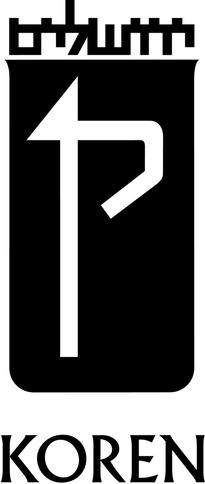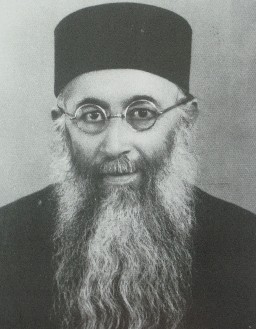
Rabbinic literature, in its broadest sense, is the entire spectrum of rabbinic writings throughout Jewish history. However, the term often refers specifically to literature from the Talmudic era, as opposed to medieval and modern rabbinic writing, and thus corresponds with the Hebrew term Sifrut Chazal. This more specific sense of "Rabbinic literature"—referring to the Talmudim, Midrash, and related writings, but hardly ever to later texts—is how the term is generally intended when used in contemporary academic writing. The terms mefareshim and parshanim (commentaries/commentators) almost always refer to later, post-Talmudic writers of rabbinic glosses on Biblical and Talmudic texts.

Yechiel Michel ha-Levi Epstein (24 January 1829 – 25 March 1908), often called "the Aruch haShulchan" after his magnum opus, Aruch HaShulchan, was a Rabbi and posek in Lithuania.

Aharon Lichtenstein was an Orthodox rabbi and rosh yeshiva who was an authority in Jewish law (Halakha).

Yisrael Meir Lau is a Holocaust survivor who served as the Ashkenazi Chief Rabbi of Israel from 1993 to 2003. He was previously Chief Rabbi of Tel Aviv, Israel. After his tenure as chief rabbi, he was appointed chairman of Yad Vashem.

Ponevezh Yeshiva, often pronounced as Ponevitch Yeshiva, is a yeshiva founded in 1908 in Ponevezh, Lithuania, and located today in Bnei Brak, Israel since 1944. The yeshiva has over three thousand students, including those of affiliated institutions, and is considered one of the leading Litvish yeshivas in Israel.
Reuvein Margolies, was an Israeli author, Talmudic scholar and head of the Rambam library.

Yeshivat Har Etzion, commonly known in English as "Gush" and in Hebrew as "Yeshivat HaGush", is a hesder yeshiva located in Alon Shvut, an Israeli settlement in Gush Etzion. It is considered one of the leading institutions of advanced Torah study in the world and with a student body of roughly 480, it is one of the largest hesder yeshivot in the West Bank.
The Yeshiva of Cape Town is a kollel and yeshiva established in 1994. Its full title is "The Rabbi Cyril and Ann Harris Yeshiva of Cape Town", named for the late Chief Rabbi. It is based in the Green and Sea Point Hebrew Congregation, in the suburb of Sea Point, Cape Town.

Koren Publishers Jerusalem is an Israeli publisher of Jewish religious texts. It was established in 1961 by Eliyahu Koren, with the aim of publishing the first Hebrew Bible designed, edited, printed, and bound by Jews in nearly 500 years. It produced The Koren Bible in 1962, The Koren Siddur in 1981, and the Koren Sacks Siddur in 2009, in addition to numerous editions of these books and other religious texts in Hebrew, English, and other languages.

Levi Cooper is an Orthodox Jewish teacher, author, and community leader who lives in Tzur Hadassah, Israel. He is a faculty member of the Pardes Institute for Jewish Studies in Jerusalem, where he teaches Midrash, Talmud, Rambam, and Hasidism. Originally from Australia, Cooper lectures extensively on the topics of law and Halakha, Jewish spirituality and Hasidic thought. Since 1996, he has also served as a historian with Heritage Seminars. He has studied at Chabad, Yeshivat Sha'alvim, the Kollel at Bar-Ilan University and Beit Morasha.

Amram Aburbeh, also spelled Abourabia and Aburabia, was the Chief Rabbi of the Sephardic congregation in Petah Tikva, Israel and author of Netivei Am, a collection of responsa, sermons, and Torah teachings.

Yaakov Hai Zion Ades, also spelled Adas or Adess, was a Sephardi Hakham, Rosh Yeshiva, and Rabbinical High Court judge. As rosh yeshiva of Porat Yosef Yeshiva in Jerusalem, he raised thousands of students, including Rabbi Ovadia Yosef, Sephardic Chief Rabbi of Israel; Rabbi Ben Zion Abba Shaul, rosh yeshiva of Porat Yosef; and Rabbi Yehuda Hakohen Rabin, Chief Rabbi of Bukharan Jewry in Israel.
Rabbi Shimon Gershon Rosenberg,, known by the acronym הרב שג"ר HaRav Shagar, was a Torah scholar and a religious postmodern thinker. His thought was characterized by Neo-Hasidism and postmodernism. In 1996 he established, together with Rabbi Yair Dreifuss, Yeshivat Siach Yitzchak, in Jerusalem. The yeshiva later moved to Givat HaDagan in Efrat and HaRav Shagar remained the head of the establishment until his death.

Yakov Meir Nagen is an Israeli rabbi and author. Nagen is a leader in interfaith dialogue and in particular interfaith peace initiatives between Judaism and Islam. He is the Director of the Blickle Institute for Interfaith Dialogue and the Beit Midrash for Judaism and Humanity. Nagen also teaches at Yeshivat Otniel and has written extensively about Jewish philosophy and Talmud.

Yisroel Hager, is one of the two Grand Rabbis of Vizhnitz in Bnei Brak and a member of Moetzes Gedolei HaTorah of Agudat Israel.
Yitzchak Zelig Morgenstern of Kotzk-Sokolov was an Admor and Rosh yeshiva, a member of the Moetzes Gedolei HaTorah and a leader of Polish Jewry before the Holocaust, who died shortly after the war began.
Rabbi Amichai Yehuda Lau-Lavie is a social entrepreneur, human rights activist and LGBT, conservative rabbi, founder and spiritual leader of the Lab/Shul community in New York.

Esti Rosenberg is an American-Israeli Orthodox Rabbanit who is the founder and head of the Migdal Oz seminary. She is the daughter of Rabbi Aharon Lichtenstein and Dr. Tovah Soloveitchik and the granddaughter of Joseph B. Soloveitchik.













